人教版初中英语九年级英语全册单元检测Unit1-15(附答案)共35页
人教版九年级全册英语Unit1单元测试卷(Word版,含答案)

人教版九年级全册英语Unit1单元测试卷(81小题,满分120分,考试用时90分钟)一、听说应用(本大题共30小题,每小题1分,共30分;A、B、C、D部分为听力理解,E部分为情景对话)A.听句子(本题共5小题,每小题1分,共5分)请根据所听内容,选择符合题意的图画回答问题,并将最佳选项的字母编号填写在题前括号内。
每个句子听两遍。
()1.How does the speaker like learning English?()2.What subject does Anna help the speaker?()3.What did the speaker put on the desk?()4.What’s the speaker’s advice?()5.What is a good way to learn English?B.听对话(本题共10小题,每小题1分,共10分)请根据每段对话的内容回答问题,从每小题所给的三个选项中选出一个最佳答案,并将最佳选项的字母编号填写在题前括号内。
每段对话听两遍。
听第一段对话,回答第6小题。
()6.What was the girl doing at 10:00 last night?A.Watching TV.B.Studying for a test.C.Reading an English magazine.听第二段对话,回答第7小题。
()7.Which is the boy’s favorite subject?A.History.B.Science.C.Math.听第三段对话,回答第8小题。
()8.Where are they talking?A.In the street.B.In a library.C.In a shop.听第四段对话,回答第9小题。
()9.How does the girl usually study English?A.By asking the teacher for help.B.By listening to tapes.C.By working with her friends.听第五段对话,回答第10小题。
人教版九年级英语全册 Unit 1 单元测试卷(含答案)
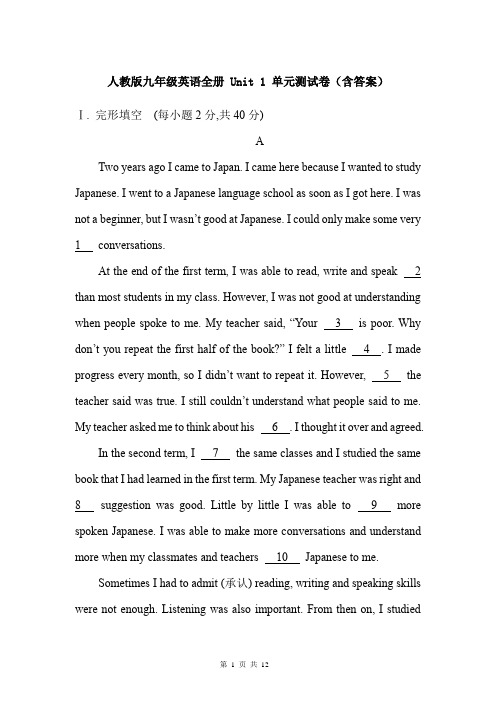
人教版九年级英语全册 Unit 1 单元测试卷(含答案)Ⅰ. 完形填空(每小题2分,共40分)ATwo years ago I came to Japan. I came here because I wanted to study Japanese. I went to a Japanese language school as soon as I got here. I was not a beginner, but I wasn’t good at Japanese. I could only make some very 1 conversations.At the end of the first term, I was able to read, write and speak 2 than most students in my class. However, I was not good at understanding when people spoke to me. My teacher said, “Your 3 is poor. Why don’t you repeat the first half of the book?” I felt a little 4 . I made progress every month, so I didn’t want to repeat it. However, 5 the teacher said was true. I still couldn’t understand what people said to me. My teacher asked me to think about his 6 . I thought it over and agreed.In the second term, I 7 the same classes and I studied the same book that I had learned in the first term. My Japanese teacher was right and 8 suggestion was good. Little by little I was able to 9 more spoken Japanese. I was able to make more conversations and understand more when my classmates and teachers 10 Japanese to me.Sometimes I had to admit (承认) reading, writing and speaking skills were not enough. Listening was also important. From then on, I studiedharder to improve my listening skill.1. A. difficult B. simple C. quick D. slow2. A. worse B. more C. better D. less3. A. reading B. writing C. listening D. speaking4. A. proud B. angry C. relaxed D. moved5. A. when B. how C. which D. what6. A. suggestion B. secret C. activity D. chance7. A. forgot B. repeated C. left D. increased8. A. his B. her C. their D. your9. A. notice B. understand C. add D. teach10. A. joined B. lent C. played D. spokeBAs a university student, I decided to learn German. I really liked the language, but I was not very good at learning it. The grammar 11me a lot and even drove me crazy. My only 12was listening—I always got an “A”. After two yea rs of study, I struggled (挣扎) to communicate in 13German and signed up (报名) to study in Germany to complete my degree. It was the hardest term I would ever have.The moment I 14Germany, I felt like I was starting from the beginning. The German I'd learned in university wasn't 15for everyday conversation. I was often nervous at school and I was 16my teachers. They always asked me some questions that I didn't understand.I only relaxed a little around my eightroommates, who were willing to speak German slowly to me and didn't seem to mind my 17.I chose to study three courses and the history class was the worst among them. The teacher spoke so 18that almost everything he said flew right over my head. I sat in the front, took notes and even recorded every single 19he said in class, but nothing helped.Years have passed, 20I still remember how it felt. That trip was a difficult but valuable lesson. I think my failure that term taught me just as much as my success.11.A.gave B.helped C.troubled D.saved12.A.action B.article C.agreement D.advantage13.A.perfect B.broken C.beautiful D.harmful14.A.arrived in B.handed in C.succeeded in D.took in15.A.peaceful B.painful eful D.careful16.A.pleased with B.angry with C.excited about D.afraid of17.A.purposes B.progress C.mistakes D.achievements18.A.slowly B.quickly C.clearly D.suddenly19.A.word B.book C.passage D.excuse20.A.and B.so C.but D.becauseⅡ.阅读理解(每小题2分,共20分)AChinese is getting more and more popular, so the UK government plans to invest (投资) 10 million pounds to help more kids learn Chinese. Do you think it is necessary for UK pupils to learn Chinese?Seneca (Canada)I studied French for 2 years in high school, and German for 4 years in college and got good marks. I studied Chinese for about 4 months before moving to China. For any language, if you don't use it, it will be easy to lose it. I've forgotten the French I learned except for a few phrases. I speak Chinese every day. My writing, reading and listening are quite good, but far from fluent. I think it's necessary to learn Chinese.Tony (the UK)Learning any language can be valuable, but it is not suitable for everyone. Chinese is a difficult language to learn, and teachers in the UK are not good at teaching foreign languages. However, China is a big and developing market for English business people. For them, Chinese is worth learning.Bill (the US)I don't think Chinese will replace (取代) English. Chinese is difficult to learn. To learn Chinese, you have to learn how to write and read it carefully. In the future Chinese will become more popular, so I think learning Chinese is a good thing.(E9301003)21.Seneca learnt German for .A.2 yearsB.4 monthsC.4 yearsD.6 years22.The underlined word “fluent” means “” in Chinese.A.糟糕的B.流利的C.完美的D.成熟的23.Tony thinks it's to learn Chinese.A.easyB.difficultelessD.interesting24.From the passage we know .A.Bill doesn't think Chinese will replace English in the futureB.Bill thinks it is easy to learn ChineseC.teachers in the UK are very good at teaching ChineseD.Seneca is very good at speaking Chinese25.What's the best title for the passage?A.How to learn Chinese wellB.Chinese is difficult to learnC.Do you like Chinese?D.Is it necessary to learn Chinese?BPerhaps you've seen the English letters “WC” in your city. They show public toilets. But do you know the expression is far from elegant (优雅的) English? In fact, foreigners from English⁃speaking countries rarely use the letters.Workers in our city are changing “WC” signs all over the city. The government is spending much money changing all the bad English on signs and restaurant menus. Many other places in China are following suit(照着做).“WC, or water closet, is old⁃fashioned English. It sounds dirty to me,” says Charlie Shifflet, a young man from the US. The old sign will become “Gents/Men” and “Ladies/Women”.“I see lots of poor English in everyday life, not only on signs,” he says. “I know what they mean. But they are Chinglish (中国式英语), not real English. For example, when someone says to me ‘My hometown is Henan Province.’ I know he should say, ‘My hometown is in Henan Province.’ ‘Hometown’ is a smaller place in a province.” The common mistakes he picked up include “Not Entry”, which should be “No Entry”. “Direction of Airport” should be changed into “To the Airport”. And it is “room rate”, not “room price”. And remember to “Keep off the grass”, rather than “Care of the green”. (E9301003)26.What does the writer think of the use of “WC”?A.He doesn't think it means “water closet”.B.He doesn't think it is old⁃fashioned English.C.He doesn't think it is proper for a sign.D.He thinks it is elegant English.27.The underlined word “rarely” means “”.A.sometimesB.seldomC.oftenD.always28.Charlie Shifflet .A.is a Chinese living in AmericaB.sometimes uses ChinglishC.likes to hear or see ChinglishD.thinks Chinese people sometimes use incorrect English29.The last paragraph is about .A.why there are so many Chinglish signsB.examples of ChinglishC.where Chinglish signs areD.who uses Chinglish signs30.We can read the passage from a magazine called “”.nguage LearningB.American HistoryC.Different CountriesD.Chinese CultureⅢ.语篇填空(每空2分,共20分)从方框中选择适当的词并用其正确形式填空,使短文通顺、意思完整。
人教版初中英语九年级英语全册单元检测Unit1-15(附答案 84页)
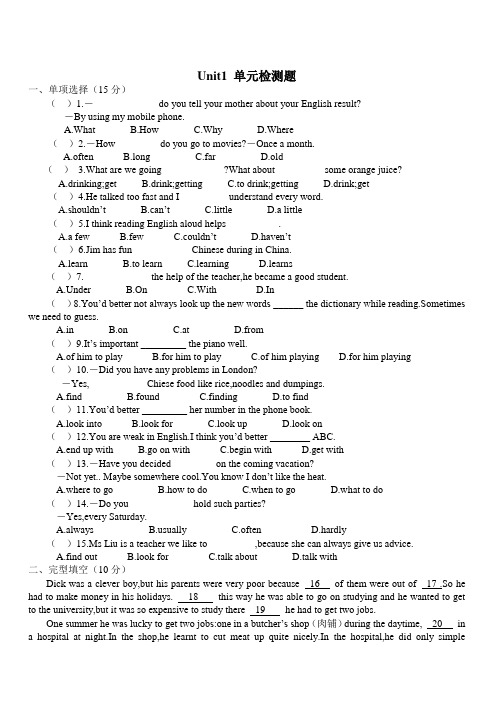
Unit1 单元检测题一、单项选择(15分)()1.-_____________do you tell your mother about your English result?-By using my mobile phone.A.WhatB.HowC.WhyD.Where()2.-How ________ do you go to movies?-Once a month.A.oftenB.longC.farD.old()3.What are we going ____________?What about _________ some orange juice?A.drinking;getB.drink;gettingC.to drink;gettingD.drink;get()4.He talked too fast and I _________ understand every word.A.shouldn’tB.can’tC.littleD.a little()5.I think reading English aloud helps __________.A.a fewB.fewC.couldn’tD.haven’t()6.Jim has fun ___________ Chinese during in China.A.learnB.to learnC.learningD.learns()7._____________ the help of the teacher,he became a good student.A.UnderB.OnC.WithD.In()8.You’d better not always look up the new words ______ the dictionary while reading.Sometimes we need to guess.A.inB.onC.atD.from()9.It’s important _________ the piano well.A.of him to playB.for him to playC.of him playingD.for him playing()10.-Did you have any problems in London?-Yes,___________ Chiese food like rice,noodles and dumpings.A.findB.foundC.findingD.to find()11.You’d better _________ her number in the phone book.A.look intoB.look forC.look upD.look on()12.You are weak in English.I think you’d better ________ ABC.A.end up withB.go on withC.begin withD.get with()13.-Have you decided ________ on the coming vacation?-Not yet.. Maybe somewhere cool.You know I don’t like the heat.A.where to goB.how to doC.when to goD.what to do()14.-Do you ____________ hold such parties?-Yes,every Saturday.A.alwaysuallyC.oftenD.hardly()15.Ms Liu is a teacher we like to _________,because she can always give us advice.A.find outB.look forC.talk aboutD.talk with二、完型填空(10分)Dick was a clever boy,but his parents were very poor because 16 of them were out of 17 .So he had to make money in his holidays. 18 this way he was able to go on studying and he wanted to get to the university,but it was so expensive to study there 19 he had to get two jobs.One summer he was lucky to get two jobs:one in a butcher’s shop(肉铺)during the daytime, 20 in a hospital at night.In the shop,he learnt to cut meat up quite nicely.In the hospital,he did only simple。
人教版九年级英语unit1---14单元综合试题及答案(Word版)
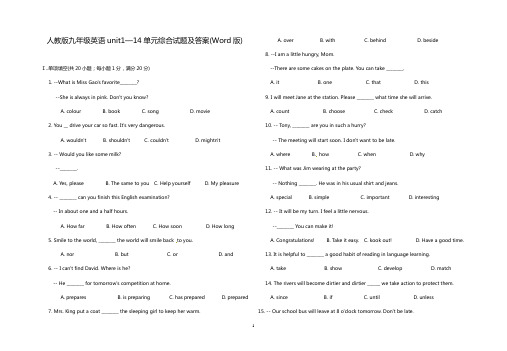
人教版九年级英语unit1—14单元综合试题及答案(Word版)Ⅰ..单项填空(共20小题;每小题1分,满分20分)1. --What is Miss Gao's favorite________?--She is always in pink. Don't you know?A. colourB. bookC. songD. movie2. You __ drive your car so fast. It's very dangerous.A. wouldn'tB. shouldn'tC. couldn'tD. mightn't3. -- Would you like some milk?--________.A. Yes, pleaseB. The same to youC. Help yourselfD. My pleasure4. -- ________ can you finish this English examination?-- In about one and a half hours.A. How farB. How oftenC. How soonD. How long5. Smile to the world, ________ the world will smile back to you.A. norB. butC. orD. and6. -- I can't find David. Where is he?-- He ________ for tomorrow's competition at home.A. preparesB. is preparingC. has preparedD. prepared7. Mrs. King put a coat ________ the sleeping girl to keep her warm.A. overB. withC. behindD. beside8. --I am a little hungry, Mom.--There are some cakes on the plate. You can take ________.A. itB. oneC. thatD. this9. I will meet Jane at the station. Please ________ what time she will arrive.A. countB. chooseC. checkD. catch10. -- Tony, ________ are you in such a hurry?-- The meeting will start soon. I don't want to be late.A. whereB.howC. whenD. why11. -- What was Jim wearing at the party?-- Nothing ________. He was in his usual shirt and jeans.A. specialB. simpleC. importantD. interesting12. -- It will be my turn. I feel a little nervous.--________ You can make it!A. Congratulations!B. Take it easy.C. kook out!D. Have a good time.13. It is helpful to ________ a good habit of reading in language learning.A. takeB. showC. developD. match14. The rivers will become dirtier and dirtier ______ we take action to protect them.A. sinceB. ifC. untilD. unless15. -- Our school bus will leave at 8 o'clock tomorrow. Don't be late.-- OK. I will be there ten minutes________.A. soonerB. slowerC. fasterD. earlier16. Thanks to the Internet, different kinds of information ________ in a short time.A. can be learnedB. has been learnedC. can learnD. has learned17. I'm surprised to hear from her. ________, we last met ten years ago.A. On one handB. That is to sayC. Believe it or notD. In other words18. The people in Ya'an have met lots of difficulties, but they haven't ________ hope.A. picked upB. given upC. looked forD. waited for19. I still remember the college and the teachers ________ I visited in London years ago.A. whatB. whoC. thatD. which20. --TV says there will be a storm tomorrow.-- ________I planned to go climbing with my classmates.A. I hope soB. I'm afraid soC. Sounds goodD. Bad luck Ⅱ.完形填空(共20小题;每小题1.5分,满分30分)AMr. and Mrs. Green were very worried about their son, Leo. He seemed to be dumb (哑的) 21 he was normal in every other way. Mr. and Mrs. Green tried everything to get him to 22 , but with no success.When Leo was six years old, the best doctors in the town 23 him carefully, but could find nothing wrong. And he seemed to be smart. It was just that he 24 spoke."There might be something wrong with his 25 , and he doesn't know he's able to speak," one doctor said."But he can read and write," said Mr. Green. "We've written him notes, telling him that he can speak.""It's certainly very 26 ," another doctor said. "Perhaps he'll be able to speak some day."27 passed. Leo went to university. But he did not speak a 28 word.Then one day, Leo was having a meal with his parents. Without any warning, he looked up from his 29 and said, "Pass me the salt, please."Mr. and Mrs. Green were excited. "You spoke! You spoke!" they cried, "Why have you 30 so long to speak?""I didn't have anything to say," he said. "Until now everything was perfect. But you forgot to put salt in these potatoes."21. A. because B. when C. though D. before22. A. speak B. walk C. play D. laugh23. A. taught B. found C. examined D. asked24. A. never B. often C. usually D. always25. A. back B. hair C. face D. mind26. A. unfair B. strange C. noisy D. quiet27. A. Hours B. Weeks C. Months D. Years28. A. good B. right C. single D. new29. A. chair B. meal C. hands D. books30. A. slept B. walked C. served D. waitedBIt is often said that eyes can speak. Do you have such kind of 31 ? In a bus you may look at a stranger, but not too, 32. If he notices that he is being looked at, he may 33 uncomfortable. It is the same in daily life. When you are looked at for several more times, you will look 34 up and down in order to 35 if there is anything wrong with you. If 36 goes wrong, you will feel angry with the person who is looking at you. 37 can speak, right?Looking too long at someone may seem to be impolite. But sometimes things are 38. If you wish to draw someone's 39 , you may look at him or her for more than ten seconds. For lovers, they enjoy looking at each other longer to show the love that words cannot 40 . Clearly, eyecommunication should be done according to the relationship between the two people and the certain situation.31. A. future B. fearC. experienceD. exercise 32. A. late B. long C. low D. loud33. A. feel B. smell C. sound D. taste34. A. itself B. himself C. myself D. yourself35. A. see B. guess C. hear D. expect36. A. something B. nothing C. everything D. anything37. A. Ears B. Eyes C. Mouth D. Nose38. A. different B. difficult C. tiring D. boring 39: A. direction B. lesson C. attention D. trouble 40. A. write B. print C. read D. express III.补全对话(共5小题;每小题1分,满分5分)Ann: Thank you for the birthday gift, Dad. It's the best gift I have ever had. Dad: 41Ann: I've always wanted a computer. 42Dad: And you need it to chat (聊天) with your friends, too.Ann: I guess you are right. 43Dad: Send an email? Er, just do like this. 44Ann: Yes, Dad. I think it's easy.Dad: 45Ann: I won't, I promise.A. Have you got it?B. Do you need help?C. I’m glad you like it.D. How can I turn it on?E. I need it to do my homework.F. Just don't spend too much time on it.G. Could you show me how to send an email?41. ________42. _________43.________44. ___ _45._____Ⅳ.阅读理解(共20小题;每小题2分,满分40分)AMany people say that they are working too many hours. They don't have enough time to relax or to stay with their family.Work hours are different from one country to another. In France, people spend about 1,646 hours a year at work. In Japan, however, people work about 2,159 hours a year. That means a Japanese worker works 513 more hours a year than a French worker.Why do people work so many hours? Some people work extra hours because they want to make more money. However, many companies don't pay overtime. Their workers don't get more pay for more work. Some people think it's their duty to work more hours. Some are afraid of losing their jobs if they don't work more hours.Many people say that their vacations are too short. In France, people get five weeks of paid vacation a year. In Germany, they get four to six weeks, and in the United States, two weeks. One study shows fewer than half of workers used all their vacation days. In Great Britain, there is a saying, "All work and no play makes Jack a dull (迟钝的) boy." If that is true, there must be a lot of dull people in the world. 46. A Japanese worker works __ more hours a year than a French one.A. 513B. 1,646C. 2,159D. 3,80547. The word "extra" in Paragraph 3 means ".A. 正常的B. 额外的C. 有用的D. 少量的48. People in ________ get only two weeks of paid vacation a year.A. FranceB. GermanyC. the United StatesD. Great Britain49. Which of the following is true according to the passage?A. No companies offer vacations to their workers.B. Many people say they have enough time to relax.C. Not all companies pay their workers for more work.D. More than half of workers use all their vacation days.50. What can we infer from the passage?A. Many workers have to work long hours.B. Many people have vacations long enough.C. Work hours are the same around the world.D. There are a lot of dull people in the world.B①"I will think of it." It is easy to say this, but do you know what great things have come from thinking? Though we can not see, or hear, or feel our thoughts, they have great power (力量) !②Isaac Newton was seated in his garden on a summer evening when he saw an apple fall from a tree. He began to think, and tried to find out why the apple fell. Then he discovered how the earth, sun, moon, and stars are kept in their places.③James Ferguson once saw the inside of his father's watch, and he wondered, "Why should I not make a watch?" This set him thinking and it led to a wooden clock which kept good time.④Walt Disney, the famous American film-maker, was often thinking of new ideas. One day, when he was in a meeting, he suddenly stopped talking, deep in thought. He looked and looked at a place high up in the room. This continued for a long time, end then he got an idea for a new cartoon.⑤Ideas come at any time, end the important thing is to think. When you meet with any difficulty, don't lose heart. Try to think of it before asking someone to help you. Think and by thinking you will learn how to think creatively.51. Newton wanted to find out ________.A. when the apple hit himB. why the apple fellC. who made the apple fallD. where the apple fell52. ________ made a wooden clock.A. Isaac NewtonB. Walt DisneyC. James FergusonD. James' father53. Walt Disney was ________ when he got an idea for a new cartoon.A. making a filmB. telling a storyC. having a meetingD. sitting in a garden 54. From the passage we can learn thatA. we should always ask others for helpB. every one of us likes thinkingC. it is easy to see and hear our thoughtsD. thinking helps to get new ideas55. Which of the following shows the structure (结构) of the passage?(①=Paragraph 1, ②= Paragraph 2, …)(BCbroadcast1/'brɔ:dkɑ:st||ˈbrɔdˌkæst/n[C] aprogramme on the radio or on television: aradio news broadcast| live broadcast( = aprogramme that you see or hear at the sametime as the events are happening)broadcast2v past tense and past participle,broadcast 1 [ I,T] to send out radio ortelevision programmes: The interview wasbroadcast live across Europe. 2 [T] to tellcurious/ˈkjʊəriəs|| 'kjur-/ adj1wanting to know about something:When I mentioned her name everyone wascurious. | [ +about]I’m incurious aboutthis book she's supposed to be writing.|curious to see/hear/know etc: Mandywas curious to hear what Peter had to sayhimself.—opposite INCURIOUS 2strange or unusual: a curious noisecoming from the cellar | curious that It'svery curious that she left without sayinggoodbye.something to a lot of people: There was no need to broadcast the fact that he lost his job. broadcaster /ˈbrɔːdkɑːstə|| ˈbrɔːdkæstər/ n [C]curl1/kɜ:l|| kɚrl/ n 1[C] a small mass of hairflask / flɑ:sk || flæsk/n [C] I BrE a special type of bottle that you use to keep liquids either hot or cold, for example when travelling 2 a flat bottle usually used to carry alcohol 3 a glass bottle with a narrow top, used in a LABORATORYflat1/flæt / adj flatter, flattest1▶SURFACE◀smooth and level, without raised or hollow areas, and not sloping or curving: a flat-bottomed boat |a perfectly flat sandy beach | flat as apollute/ pə'lu:t/ v[T] 1 to make air, water, soil etc dangerously dirty and not suitable for people to use: beaches polluted by raw sewage|industrial emissions that pollute the air2 pollute sb’s mind to give someone immoral thoughts and spoil their character: fears that Lawrence's novels would pollute young minds--polluted adj:polluted rivers--polluter n [C]pollution / pəˈlu:ʃn /n [U] 1 the process of making56. The pronunciation of the word "broadcast" is ____ or/ˈbrɔdˌkæst /.A. /'brɔ:dkɑ:st/B. /'brəu d'sɑ:st/C. /bræd'kɔst/D. /'br u:dkɑ:st/57. The word"____ "can be used as an adjective (形容词).A. polluteB. pollutionC. curiousD. curiously58. Which of the following is a flask?A. B. C. D.59. The word "pollute" means "______".A. to tell something to a lot of peopleB. wanting to know about somethingC. a programme on the radio or on TVD. to make air. water, soil, etc dirty60. These texts are probably from ______.A. a magazineB. a dictionaryC. a newspaperD. an advertisementDThe human brain weighs about 1.4 kilograms, but it can, hold much more information than most computers. However, there is another difference between humans and computers. Computers don't forget information they are given, but humans often do. No one remembers everything, and luckily we don't usually have to. But everyone can improve their memory if they want to. Here are some suggestions.◆Try to use new informati6n immediately. For example, if you meet someone who says "Hi! I'm Carlos," don't just say "Hello." Repeat the person's name. Say"____"◆Break a big number into smaller parts. For example, it's hard to memorize (记忆) 109244153. But if you break it into three parts--109/244/153—it becomes easier.◆Write out what you need to remember ever and over again. This will help you keep it in mind longer, especially for memorizing formulas (公式) or facts.◆Always review information. If you bring what you've learned back to your mind, they become easier to remember. For example, before you go to sleep, it’s a good idea to review the new things you learned that clay.◆Discuss with a friend. It is always easier to remember things through discussions. You can have a discussion about what's right and what's wrong, and it will lead to the ri ght answer.◆Never tell yourself that you have a bad memory. You can always do something to help improve your memory. And everyone's memory gets better if they use it often enough.All of the suggestions are helpful. If you follow them, you are certain to improve your memory.61. How many suggestions are mentioned in the passage?A. Three.B. Four.C. Five.D. Six.62. Which should be put in the blank (空格) in Paragraph 2?A. Hello, Carlos.B. How do you do?C. Hello, I am Sophia.D. Glad to meet you!63. What can help memorize a big number more easily according to the passage?A. T o store it in a computer.B. To break it into stunner parts.C. T o discuss it with a friend.D. T o review it before you sleep.64. Which of the following is true according to the passage?A. Discussing with friends can help you remember things.B. Always reviewing information can help you fall asleep.C. Formulas and facts can help you learn about your brain.D. Human beings can improve their memory by computer.65. What does the sentence "Never tell yourself that you have a bad memory”mean?A. You should tell others about your bad memory.B. You should believe in other people all the time.C. You should ask others to improve their memory.D. You should ho confident in your memory ability.第四部分写(共两大题,满分25分)Ⅴ. 单词拼写(共5小题;每小题1分,满分5分)66. What do you like to do in your f______(空闲的) time?67. I could hear her sweet v______ (噪音) from the next room.68. Travelling by plane is expensive, but it s______ (节省) time.69. Would you please make a shopping l________ (清单) for the picnic?70. It's polite to k______ (敲) on the door before entering a room.Ⅵ. 书面表达(共1小题;满分20分)今天是父亲节。
人教版九年级英语(全一册)单元测试题全套及答案
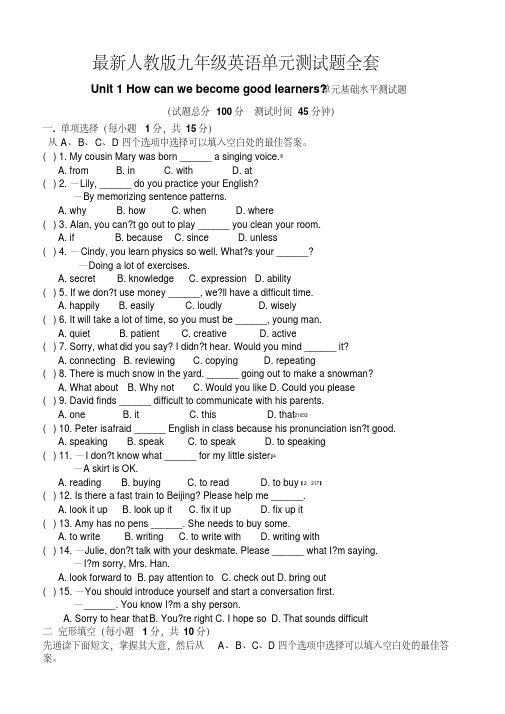
最新人教版九年级英语单元测试题全套Unit 1 How can we become good learners?单元基础水平测试题(试题总分100分测试时间45分钟)一.单项选择(每小题1分,共15分)从A、B、C、D四个选项中选择可以填入空白处的最佳答案。
( ) 1. My cousin Mary was born ______ a singing voice. 8A. fromB. inC. withD. at( ) 2. —Lily, ______ do you practice your English?—By memorizing sentence patterns.A. whyB. howC. whenD. where( ) 3. Alan, you can?t go out to play ______ you clean your room.A. ifB. becauseC. sinceD. unless( ) 4. —Cindy, you learn physics so well. What?s your ______?—Doing a lot of exercises.A. secretB. knowledgeC. expressionD. ability( ) 5. If we don?t use money ______, we?ll have a difficult time.A. happilyB. easilyC. loudlyD. wisely( ) 6. It will take a lot of time, so you must be ______, young man.A. quietB. patientC. creativeD. active( ) 7. Sorry, what did you say? I didn?t hear. Would you mind ______ it?A. connectingB. reviewingC. copyingD. repeating( ) 8. There is much snow in the yard. ______ going out to make a snowman?A. What aboutB. Why notC. Would you likeD. Could you please( ) 9. David finds ______ difficult to communicate with his parents.A. oneB. itC. thisD. that21032( ) 10. Peter is a fraid ______ English in class because his pronunciation isn?t good.A. speakingB. speakC. to speakD. to speaking( ) 11. —I don?t know what ______ for my little sister.04—A skirt is OK.A. readingB. buyingC. to readD. to buy【2:217】( ) 12. Is there a fast train to Beijing? Please help me ______.A. look it upB. look up itC. fix it upD. fix up it( ) 13. Amy has no pens ______. She needs to buy some.A. to writeB. writingC. to write withD. writing with( ) 14. —Julie, don?t talk with your deskmate. Please ______ what I?m saying.—I?m sorry, Mrs. Han.A. look forward toB. pay attention toC. check outD. bring out( ) 15. —You should introduce yourself and start a conversation first.—______. You know I?m a shy person.A. Sorry to hear thatB. You?re rightC. I hope soD. That sounds difficult二完形填空(每小题1分,共10分)先通读下面短文,掌握其大意,然后从A、B、C、D四个选项中选择可以填入空白处的最佳答案。
最新人教版九年级英语单元测试题全册含答案

最新人教版九年级英语单元测试题全册含答案(14个单元,共14套,含答案)Unit1单元测试题Ⅴ.单项选择从A、B、C、D四个选项中选择可以填入空白处的最佳答案。
()21.MycouinMarywaborn______aingingvoice.A.fromB.inC.withD.at()22.—Lily,______doyoupracticeyourEnglih—Bymemorizingentencepattern.A.whyB.howC.whenD.where()23.Alan,youcantgoouttoplay______youcleanyourroom.A.ifB.becaueC.inceD.unle()24.—Cindy,youlearnphyicowell.Whatyour______—Doingalotofe 某ercie.A.quietB.patientC.creativeD.active()27.Sorry,whatdidyouayIdidnthear.Wouldyoumind______itA.connectingB.reviewingC.copyingD.repeating()28.Thereimuchnowintheyard.______goingouttomakeanowmanA.oneB.itC.thiD.that()30.Peteriafraid______Englihinclabecauehipronunciationintgo od.A.peakingB.peakC.topeakD.topeaking()31.—Idontknowwhat______formylittleiter.—AkirtiOK.A.readingB.buyingC.toreadD.tobuy()32.IthereafattraintoBeijin gPleaehelpme______.A.lookitupB.lookupitC.fi某itupD.fi某upit()33.Amyhanopen______.Sheneedtobuyome.A.towriteB.writingC.towritewithD.writingwith()34.—Julie,donttalkwithyourdekmate.Pleae______whatImaying.—Imorry,Mr.Han.A.lookforwardtoB.payattentiontoC.checkoutD.bringout()35.—Youhouldintroduceyourelfandtartaconverationfirt.—______.YouknowImahyperon.A.SorrytohearthatB.YourerightC.IhopeoD.ThatounddifficultⅥ.完形填空(每小题1分,共10分)先通读下面短文,掌握其大意,然后从A、B、C、D四个选项中选择可以填入空白处的最佳答案。
人教版 九年级英语 全册写作同步练习1-15单元
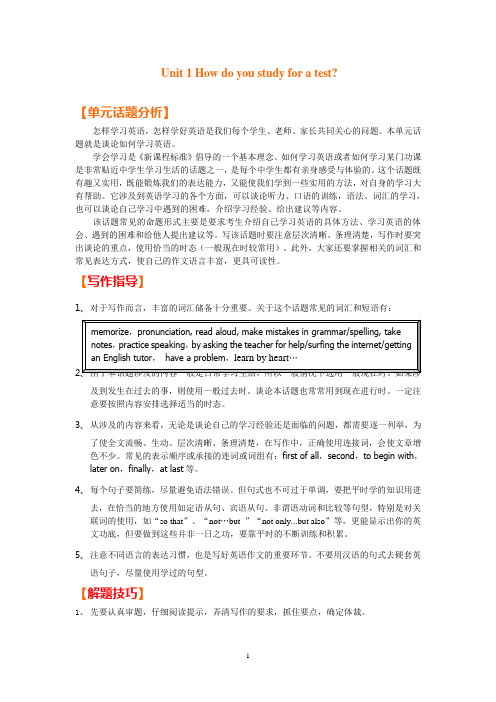
Unit 1 How do you study for a test?【单元话题分析】怎样学习英语,怎样学好英语是我们每个学生、老师、家长共同关心的问题。
本单元话题就是谈论如何学习英语。
学会学习是《新课程标准》倡导的一个基本理念。
如何学习英语或者如何学习某门功课是非常贴近中学生学习生活的话题之一,是每个中学生都有亲身感受与体验的。
这个话题既有趣又实用,既能锻炼我们的表达能力,又能使我们学到一些实用的方法,对自身的学习大有帮助。
它涉及到英语学习的各个方面,可以谈论听力、口语的训练,语法、词汇的学习,也可以谈论自己学习中遇到的困难,介绍学习经验、给出建议等内容。
该话题常见的命题形式主要是要求考生介绍自己学习英语的具体方法、学习英语的体会、遇到的困难和给他人提出建议等。
写该话题时要注意层次清晰、条理清楚,写作时要突出谈论的重点,使用恰当的时态(一般现在时较常用)。
此外,大家还要掌握相关的词汇和常见表达方式,使自己的作文语言丰富,更具可读性。
【写作指导】1、对于写作而言,丰富的词汇储备十分重要。
关于这个话题常见的词汇和短语有:2及到发生在过去的事,则使用一般过去时。
谈论本话题也常常用到现在进行时。
一定注意要按照内容安排选择适当的时态。
3、从涉及的内容来看,无论是谈论自己的学习经验还是面临的问题,都需要逐一列举,为了使全文流畅、生动、层次清晰、条理清楚,在写作中,正确使用连接词,会使文章增色不少。
常见的表示顺序或承接的连词或词组有:first of all,second,to begin with,later on,finally,at last等。
4、每个句子要简练,尽量避免语法错误。
但句式也不可过于单调,要把平时学的知识用进去,在恰当的地方使用如定语从句、宾语从句、非谓语动词和比较等句型,特别是对关联词的使用,如“so that”、“not…but ”“not only...but also”等,更能显示出你的英文功底,但要做到这些并非一日之功,要靠平时的不断训练和积累。
人教版九年级英语全册 各单元测试题附答案共14套
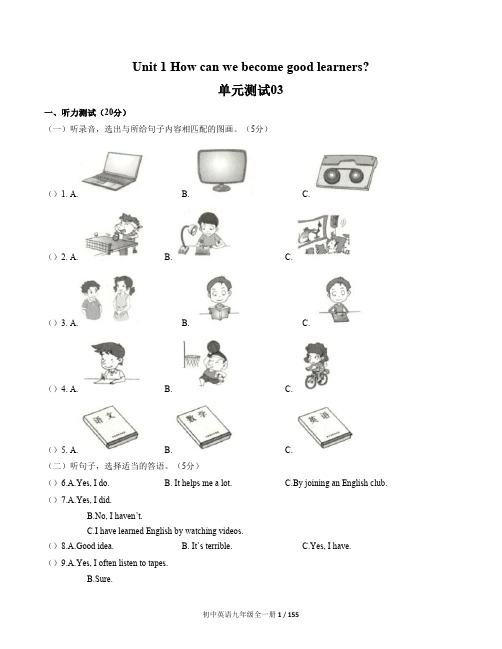
Unit1How can we become good learners?单元测试03一、听力测试(20分)(一)听录音,选出与所给句子内容相匹配的图画。
(5分)()1.A. B. C.()2.A. B. C.()3.A. B. C.()4.A. B. C.()5.A. B. C.(二)听句子,选择适当的答语。
(5分)()6.A.Yes,I do. B.It helps me a lot. C.By joining an English club.()7.A.Yes,I did.B.No,I haven’t.C.I have learned English by watching videos.()8.A.Good idea. B.It’s terrible. C.Yes,I have.()9.A.Yes,I often listen to tapes.B.Sure.C.Never mind.()10.A.No,I haven’t. B.No,I can’t. C.Yes,I do.(三)听短文,选择最佳答案。
(5分)()11.What was LiHong like before?A.Shy.B.Serious.C.Careless.()12.What was she afraid to do in the English classes?A.Recite texts.B.Answer questions.C.Write compositions.()13.When did she begin to show interest in English?A.Five years ago.B.At the age of16.C.After going to middle school.()14.How did she learn English in her free time?A.By reading English stories.B.By listening to English songs.C.By going to the English corner.()15.What does she hope to do?A.To teach English.B.To study abroad.C.To travel abroad.(四)根据你所听到的内容,填写下面的表格,每空不超过3个单词。
- 1、下载文档前请自行甄别文档内容的完整性,平台不提供额外的编辑、内容补充、找答案等附加服务。
- 2、"仅部分预览"的文档,不可在线预览部分如存在完整性等问题,可反馈申请退款(可完整预览的文档不适用该条件!)。
- 3、如文档侵犯您的权益,请联系客服反馈,我们会尽快为您处理(人工客服工作时间:9:00-18:30)。
Unit1 单元检测题一、单项选择(15分)()1.-_____________do you tell your mother about your English result?-By using my mobile phone.A.WhatB.HowC.WhyD.Where()2.-How ________ do you go to movies?-Once a month.A.oftenB.longC.farD.old()3.What are we going ____________?What about _________ some orange juice?A.drinking;getB.drink;gettingC.to drink;gettingD.drink;get()4.He talked too fast and I _________ understand every word.A.shouldn‘tB.can‘tC.littleD.a little()5.I think reading English aloud helps __________.A.a fewB.fewC.couldn‘tD.haven‘t()6.Jim has fun ___________ Chinese during in China.A.learnB.to learnC.learningD.learns()7._____________ the help of the teacher,he became a good student.A.UnderB.OnC.WithD.In()8.You‘d better not always look up the new words ______ the dictionary while reading.Sometimes we need to guess.A.inB.onC.atD.from()9.It‘s important _________ the piano well.A.of him to playB.for him to playC.of him playingD.for him playing()10.-Did you have any problems in London?-Yes,___________ Chiese food like rice,noodles and dumpings.A.findB.foundC.findingD.to find()11.You‘d better _________ her number in the phone book.A.look intoB.look forC.look upD.look on()12.You are weak in English.I think you‘d better ________ ABC.A.end up withB.go on withC.begin withD.get with()13.-Have you decided ________ on the coming vacation?-Not yet.. Maybe somewhere cool.You know I don‘t like the heat.A.where to goB.how to doC.when to goD.what to do()14.-Do you ____________ hold such parties?-Yes,every Saturday.A.alwaysuallyC.oftenD.hardly()15.Ms Liu is a teacher we like to _________,because she can always give us advice.A.find outB.look forC.talk aboutD.talk with二、完善填空(10分)Dick was a clever boy,but his parents were very poor because 16 of them were out of 17 .So he had to make money in his holidays. 18 this way he was able to go on studying and he wanted to get to the university,but it was so expensive to study there 19 he had to get two jobs.One summer he was lucky to get two jobs:one in a butcher‘s shop(肉铺)during the daytime, 20 in a hospital at night.In the shop,he learnt to cut meat up quite nicely.In the hospital,he did only simple jobs,like helping to lift people and to carry them from one part of the hospital to another.He must 21 white clothes in these two places.One evening in the hospital,Dick helped to carry a woman from her bed to the operating table.because the woman had to have an operation.The woman was 22 of the operation before Dick came to get her.But as soon as she saw him,she got even 23 frightened.She had seen Dick 24 meat in the butcher‘s before.―No!No!‖she cried.―I won‘t25 by a butcher.‖()16.Aboth B.neither C.each D.either()17A.job B.work C.school D.office()18.A.By B.On C.In D.At()19.A.and B.so C.then D.that()20.A.other B.others C.the other D.another()21.A.wear B.dress C.put on D.wearing()22.A.afraid B.asleep C.away D.worried()23.A.much B.more C.very D.little()24.A.cuts B.to cut C.cutting D.to be cut()25.A.operate B.operated on C.be operated on D.be operated三、阅读理解(30分)(A)Neghborhood yentas are well-known women.They spend most of their time watching people around them.The yentas have this titl e for this.―Yenta‖is a Yiddish word.It means a trouble maker or a talkative person.Nobody in the street is safe from their eyes or tongue.Yentas certainly are not bad people.They pass on messages and advice.They give up-to-the-minute weather reports.They know who is doing what.They see,hear,and know all and usually repeat it.They have called themselves reporters.Some of the yentas‘ neighbors think them so interested in others‘ things that they forget their own. Sometimes,however,a child has to be found,or a robbery has to be reported.Then what yentas do is helpful.Every neighborhood appreciates its yentas very much.It doesn‘t matter what their color,belief or accent is.()26.From the passage we know that a yenta __________.A.is famous for watching people walkingB.likes talking about othersC.can be either a man or a womanD.is not a help at all()27.If you live near a yenta,you ___________.A.will not be safeB.can‘t stop yourself from being watchedC.will be stopped when you pass byD.have to pay for their help()28.When you are in trouble,yentas __________.A.will make a joke on youB.will watch you all the timeC.can sometimes give you a handD.will report that to the police()29.The word ―up-tp-the-minute‖ means _________.A.oldestB.besttestD.worst()30.Which of the following is NOT true?A.We can get weather reports from yentas.B.You can learn things about neighbors from yentas.C.Yentas are sometimes a help to others.D.Yentas care mor about themselves than about others.(B)My name is Chen Lan.My home is in Gulangyu. Do you know Gulangyu? It is in Xiamen. It is near the sea. Gulangyu is a small place,but it is very nice and clean. There are no cars,no buses and no bikes. People noly walk. So it is very quiet. People ,go to visit Gulangyu by ship.Our house is in the middle of Gulangyu. Behind our house there is a big tree.My grandfather tells me that the tree is very,very old. Th ere are many birds in the tree. We call it a ―bird tree‖. Our house is near the sea. The sea is big and blue. There are a lot of fish in the sea. After school,I go there and catch fish with my friends. It is very interesting. I like fish and I like catching fish.根据短文判断正误,在正确的句子前填上(T),在错误的句子前填上(F)。
